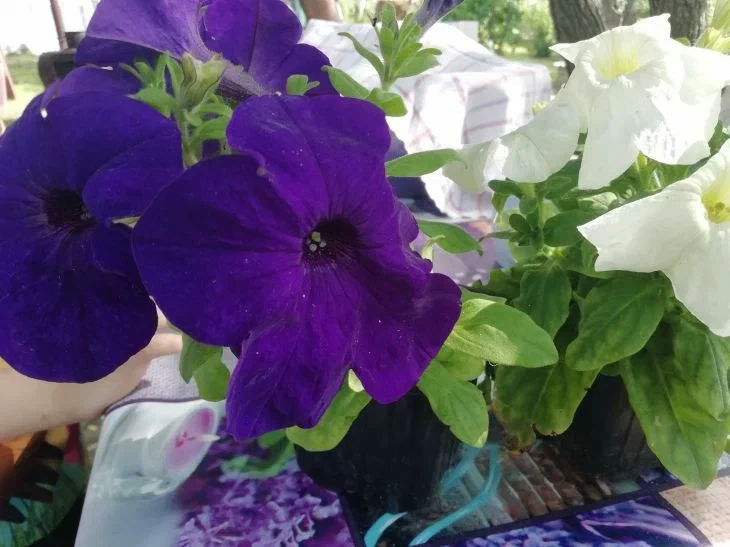Petunias are beautiful and popular flowers that can decorate any garden or balcony. However, to grow a beautiful plant, you need to choose the right healthy seedlings.
Today we will tell you how to choose the right petunia seedlings and grow a beautiful plant from them.
How to grow petunia seedlings, says expert of the online publication Belnovosti, scientist-agronomist, landscape designer Anastasia Kovrizhnykh .
Selecting seedlings
Before you buy seedlings, you need to decide on the type of petunia you want to grow. There are several types of petunias, including hybrids, perennials, and annuals.
Each type has its own characteristics, so choose the one that suits you best.

When choosing seedlings, you need to pay attention to their appearance. The seedlings should be healthy, strong and should not have signs of disease or damage. The leaves should be green and juicy, and the stems should be strong and not too thin.
Preparing the soil and pots
Before planting the seedlings, you need to prepare the soil and pots. The soil should be light and nutritious. You can use a ready-made mixture for petunias or prepare it yourself from peat, humus and sand.
The pots should be large enough to give the seedlings enough room to grow. The pots should also have drainage holes so that excess moisture can escape.
Transplanting
Before planting the seedlings, it is necessary to water them well. When planting the seedlings, you should make sure that the roots of the seedlings are not damaged and they fit freely into the soil.
The seedlings should be planted at a depth equal to the height of their pot. After planting, the seedlings should be watered well so that the soil is moist.
Plant care
After planting the seedlings, you need to take care of the plant so that it grows healthy and beautiful. Here are some tips on how to properly care for petunias.
Water the plant regularly, but do not over-water the soil. Petunias like a moderate amount of moisture, so you need to make sure that the soil is moist, but not wet.
Feed the plant regularly. Petunias need nutrients, so they need to be fed with fertilizers for flowers. You can use ready-made fertilizers or make them yourself from manure or compost.
Remove spent flowers and wilted leaves. This will help the plant focus its energy on growing new flowers and leaves.
Trim the plant to prevent it from growing too tall and losing its shape. Trimming also helps encourage new flowers and leaves to grow.
Protect the plant from insects and diseases. Use special insecticides and fungicides to prevent damage to the plant by insects and diseases.
Preparing for winter
If you are growing petunias outdoors, it is important to prepare the plant for the winter period. At the end of the season, the plant begins to prepare for winter, and its leaves begin to turn yellow and fall off.
At this point, it is necessary to remove all the withered leaves and flowers and leave only healthy ones.
Petunias can overwinter in pots in a room with a temperature of 5 to 10 degrees, but it is best to transplant the plant into open ground to a depth of at least 10 cm. When transplanting, make sure that the roots of the plant are not damaged and they fit freely into the soil.
Conclusions
Petunias are beautiful and popular flowers that can decorate any garden or balcony. But to grow a healthy and beautiful petunia, you need to follow a few tips.
First, you need to choose the right seedlings. Choose only healthy and strong sprouts, with roots that are not dried out or damaged. Then you should prepare the soil, providing the right pH level and the necessary nutrients. Petunias like a moderate amount of moisture and light, so choose a place where they will receive enough sunlight and carefully monitor watering.
Next, you need to properly care for the plant, including regular watering and feeding with flower fertilizers.
Removing faded flowers and wilted leaves, as well as pruning, will help stimulate the growth of new flowers and leaves. Do not forget to protect the plant from insects and diseases using special insecticides and fungicides.
At the end of the season, petunias need to be prepared for winter by removing all withered leaves and flowers. Petunias can overwinter both in pots indoors with a temperature of 5 to 10 degrees, and in open ground at a depth of at least 10 cm.
By following these tips, you will be able to grow a beautiful and healthy petunia that will decorate your garden or balcony and delight you with its bright flowers throughout the season.
Earlier we told you that it is better to choose peat or coconut substrate.









